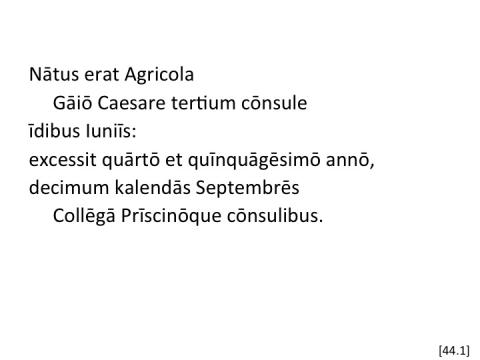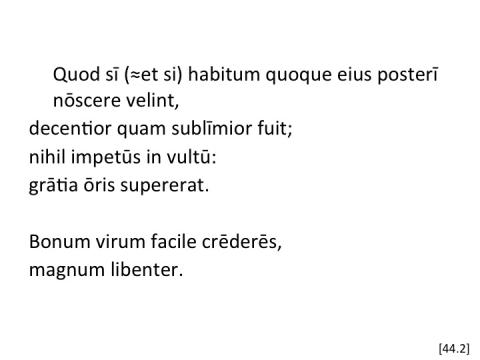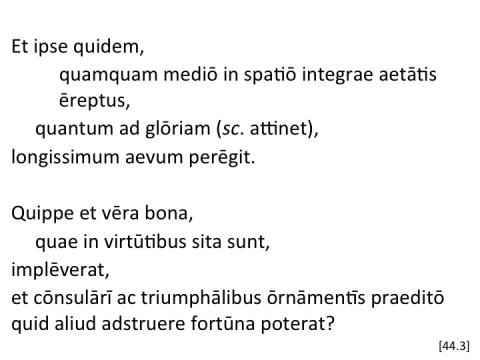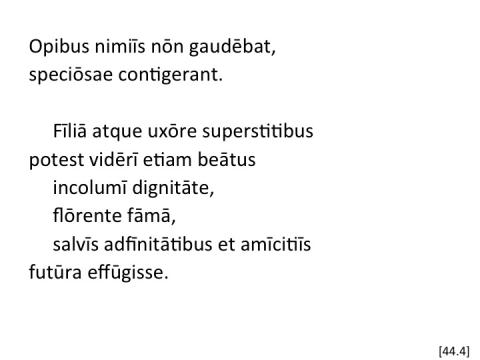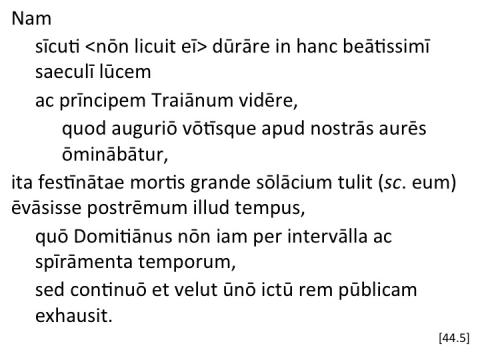Overview: Dates of Agricola's birth and death; his personal appearance; he died in his prime, yet fortune had so blessed him that he would have gained nothing by living longer. (Stuart)
44.1
Gāiō Caesare tertium cōnsule, etc.: i.e. June 13, 40 CE. Only one consul here is given, because the colleague of Caligula died before entering upon his office, and, hence, only one name was recorded in the Fasti consulares. (Gudeman); tertium: an adverb, "for the third time." (Damon)
decimum kalendās Septembrēs: a standard shorthand for the Roman dating formula, in full ante diem decimum kalendas Septembres, "on the 10th day before the kalends of September," which employs inclusive counting and means "nine days before 1 September," or 23 August. Decimum is the reading of the principal manuscript; its descendants have decimo. (Damon) decumo kalendās Septembrēs: i.e. decumo (die) ante kalendas Septembris. This natural expression was replaced in current use by that of the text, or, more commonly, by the trajection of ante, ante diem decumum kalendas Septembris. (Pearce)
Collēgā Priscoque cōnsulibus: i.e. 93 CE. They were not consuls at the actual time of Agricola’s death, but as consules ordinarii give their name to the whole year. (Pearce) Conlegā: Pompeius Conlega. He is mentioned as the youngest ex-consul to give his opinion in regard to the punishment of Marius Priscus, the proconsul of Africa, who was convicted of extortion in 100 CE, Pliny and Tacitus appearing for the plaintiff. (Gudeman) Prīscinōque: the name, which is known from an inscription published in 1910, has been corrupted to Prisco in the manuscript. See Harrar (1917). (Damon)
44.2
quod si: functionally equivalent to et si. See note on 12.4. (Damon)
habitum: descriptions of personal appearance form a typical feature of ancient biography. In the specimens in Latin literature best known to us this rubric more frequently precedes the account of the death. (Stuart); "external appearance." (Gudeman)
decentior quam sublīmior: "graceful rather than imposing." (Stuart); i.e. he was handsome, but not of commanding stature. (Pearce); decentior serves as a comparative for decorus, the Latin avoiding, if possible, the collocation of r’s so e.g. ferus, ferocior; mirus, mirabilior. The present form is, however, rare, except in Quintilian. (Gudeman)
nihil impetūs: "nothing to betoken a vehement nature." (Stuart); "nothing passionate." (Pearce)
grātia ōris: "genial, sweet expression." In this objective sense, the word is found only in poetry and post-Augustan prose, and is especially frequent in Quintillian. (Gudeman)
supererat: superesse means here not ‘to be left over’ but ‘to be present in abundance.’ See ch. 45.5. (Pearce); "predominated." For other meanings of this word, see ch. 22.4, 44.2, 45.5. (Gudeman)
crēderēs: to denote an action as possible, the present (potential) subjunctive can be used; e.g. credas, "you would think." In a retrospective view of this situation, the subjunctive is put into the past; e.g. crederes, "you would have thought." (Pearce) [A&G 447.2]
44.3
et ipse: marking the beginning of a new topic. (Stuart)
integrae aetātis: rhetorical circumstances alter cases. In chapter 3.2, Tacitus at the age of forty-two classes himself with the senes. (Stuart); not partitive, but defining medio spatio, "in mid career while his vigour was unimpaired." (Pearce) mediō in spatiō integrae aetātis ēreptus: the comparison of life with a race-track is commonplace ... . integrae is virtually equivalent to an appositional clause, defining spatio aetatis. We may, therefore, translate: "cut off in the very prime of life, while his faculties were still unimpaired." (Gudeman)
quantum ad glōriam: supply pertinet. (Stuart); sc. attinet. (Pearce)
quippe: frequent in Tacitus in the sense of enim or nam, with the usual ellipsis. (Gudeman)
vēra bona ... in virtūtibus: the doctrine of the Stoics which, however, Tacitus here interprets practically, not in its theoretical extreme. To the true Stoic political preferment and power were neither good nor bad—they were non-essentials; whereas Tacitus counts official honors as a part of the sum total of Agricola’s good fortune. (Stuart)
implēverat: "had achieved completely." (Stuart); in a pregnant sense, "he had enjoyed to the full." (Pearce)
triumphālibus, etc.: in this passage the honor of the triumphal ornaments is treated with less depreciation than in ch. 40.1. (Gudeman)
quid aliud adstruere fortūna poterat: assurance on points about which a Roman reader would desire to be informed before agreeing to the statement — put as a rhetorical question — that Agricola was completely blessed, is contained in the two sentences following. (Stuart)
adstruere: "bestow in addition." (Gudeman)
44.4
opibus nimiīs, etc.: forestalling the natural question—Did he have money enough to free him from care? That at least a competence was necessary to a happy life was a practical view characteristic of the Roman. (Stuart); "he took no delight in excessive riches, and, as a matter of fact, resplendent wealth had not fallen to his lot." speciosus is a very strong expression. The statement itself is amply confirmed by other passages in this treatise, for the loss of Agricola’s patrimony (ch. 4.2; 7.1), his conduct as praetor (ch. 6.4), his scrupulous honesty (ch. 6.2; 9.4), and the special emphasis laid upon his not receiving a proconsular salary (ch. 42.2) are all alike incompatible with great wealth. (Gudeman)
nōn gaudēbat: "he did not delight in." (Stuart)
speciōsae (sc. opes) = "a respectable fortune." (Pearce); "special wealth." (Stuart)
fīliā atque uxōre superstitibus: the following sentence anticipates the objection that Agricola's death at a vigorous age was a misfortune. (1) Agricola died without regrets. (2) He was fortunate to escape the future. (Stuart); "as his wife and daughter survived him, he may be even accounted blest in having escaped the future while his position was still unimpaired," &c. The place of the ablative absolute phrase at the head of the sentence marks it as the one indispensable condition which allowed Agricola to be esteemed "blest" in virtue of the circumstances of his death. (Pearce)
potest vidērī ... beātus ... effūgisse: this can be construed in two ways. Effugisse completes the sense of either beatus ("fortunate in having escaped") or videri beatus ("to seem to have escaped with his good fortune intact"). The former construction is hard to parallel but works better with the sentence's initial and medial ablative absolutes. (Damon) [A&G 461]
dignitāte: "rank." (Stuart)
adfīnitātibus et amīcitiīs = adfinibus et amicis, here used in an asyndetic enumeration, because the preceding nouns are abstract. (Gudeman)
44.5
sīcut ... ita: "although ... yet." (Stuart)
principem: "as emperor." (Stuart)
quod ... ōminābātur: "an event which in my hearing he more than once made the object of prophecy and prayerful wish." This may be a prophecy manufactured by Tacitus ex eventu and intended as a compliment to Trajan. However, as Trajan was a rising man several years before the death of Agricola and had acquired a military reputation, there is no wild improbability in the story. (Stuart); "an event which he used to foretell and pray for." (Pearce) auguriō vōtīsque: correspond chiastically to durare in ... lucem, and principem ... videre, a word like optabat being supplied with votis out of ominabatur, i.e. in his prayers he hoped to see the present happy age, and he prophetically foretold the accession of Trajan to the throne. Trajan's achievements in Germany before 91 CE, the year of his consulship, had drawn attention to him ... . The involved structure of the sentence was due to the author's striving after conciseness. (Gudeman) apud nostrās aurēs: "in my presence." An instance of synecdoche. (Gudeman) ōminābātur = augurabatur et valde optabat. An instance of the so-called constructio praegnans. (Gudeman)
festīnātae mortis: objective genitive. (Gudeman) [A&G 347-48]
sōlācium tulit ēvāsisse: the subject of tulit is unexpressed. Stuart takes Agricola to be the subject, while Pearce supplies eum and takes the accusative/infinitive to be the subject (see notes below). These different interpretations also affect the identity of the consoled: Agricola (somewhat illogically) for Stuart, Agricola's family for Pearce. (Damon) sōlācium tulit: "he gained by way of consolation." (Stuart) tulit: sc. nobis. (Pearce) ēvāsisse: sc. eum. Subject to tulit. (Pearce) [A&G 452]
illud: "well remembered by the reader." The end of Domitian’s reign, like that of Tiberius, was marked by wholesale bloodshed, in each case a reprisal for conspiracy fomented by members of the aristocracy. (Stuart)
spīrāmenta: "breathing spaces," "pauses." (Pearce)
continuō: take as an adverb. (Stuart)
velut ūnō ictū: because blow followed close on blow. The thought is suggestive of the famous wish of Caligula that the Roman people had but one neck. (Stuart)
exhausit: continuing the metaphor of the weapon; exhaurire here means "to deal a death-blow." (Stuart); = perfodit; merely strengthened form of haurire which very often used in this sense. The other, generally accepted meaning, "to drink up the blood, sap the strength of," though still more common both in the simple and compound verb, would unnecessarily introduce mixed metaphor. (Gudeman)

